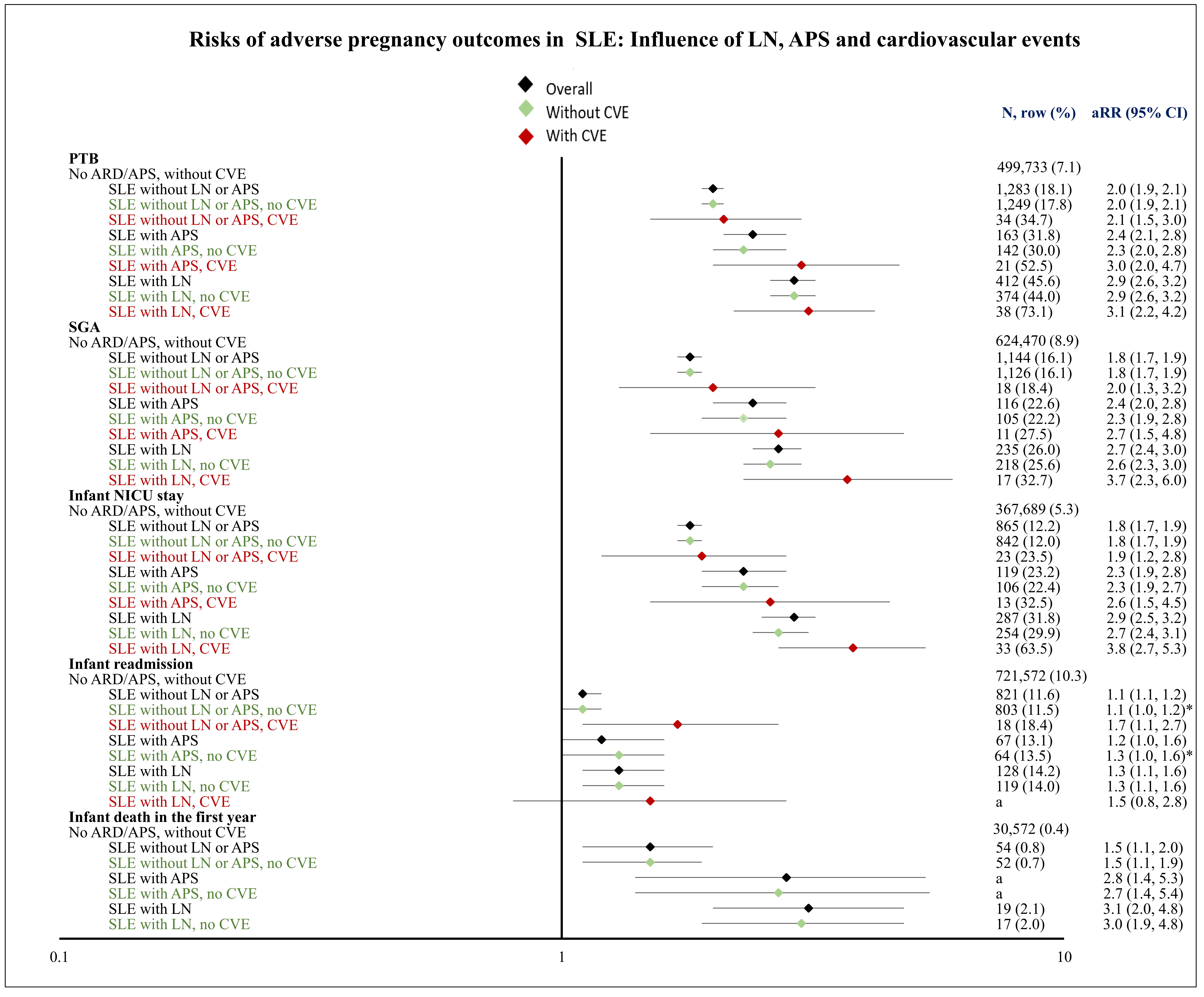Session Information
Session Type: Abstract Session
Session Time: 1:00PM-2:30PM
Background/Purpose: Systemic Lupus Erythematosus (SLE) presents substantial risks for both maternal cardiovascular events (CVEs) and adverse pregnancy outcomes, yet, the influence of maternal CVEs on SLE-related adverse pregnancy outcomes is not well elucidated. We aimed to study the risks of various adverse pregnancy outcomes across different SLE subgroups, specifically focusing on examining the influence of CVEs.
Methods: Utilizing data from the Study of Outcomes in Mothers and Infants (SOMI), a California population-based birth cohort from 2005-2020, we identified pregnant individuals with SLE, including those with lupus nephritis (LN) and antiphospholipid syndrome (APS), via International Classification of Diseases (ICD) codes on maternal discharge records. Maternal CVEs, baseline covariates, and adverse pregnancy outcomes such as preterm birth (PTB), small-for-gestational-age (SGA) infants, neonatal intensive care unit (NICU) utilization, infant readmissions, and infant mortality within the first year were similarly identified from hospitalization records and birth certificates. PTB was defined as birth before 37 weeks of gestation, and SGA infants as those below the 10th percentile for age and sex. Log-linear regression with a Poisson distribution was used to calculate adjusted relative risks (aRRs) and 95% confidence intervals (CI) of the association between adverse pregnancy outcomes and SLE (by the presence of LN or APS, and further stratified by CVEs) compared against a reference group of pregnant women without autoimmune rheumatic diseases (ARDs) or APS, or CVEs.
Results: The sample included 7,004,334 live-born singletons from individuals without ARDs or APS, and 8,422 from SLE, including 903 and 513 from SLE with LN and APS, respectively. Cardiovascular events complicated17,130 (0.2%) of pregnancies in individuals without ARDs or APS, 176 (2.1%) with SLE, including 52 (5.8%) with LN and 40 (7.8%) with APS. Compared to 7.1% and 8.9% occurrence of PTB and SGA infants in the reference group, the incidence was higher in SLE without LN or APS (18.0% and 16.1%), SLE with APS (31.8% and 22.6%), and SLE with LN (45.6% and 26.0%), respectively. Notably, 73.1% of SLE with LN complicated by CVEs experienced PTB, and 32.7% had SGA.
Compared to the reference group, SLE without LN or APS had 1.8 to 2.1-fold higher risks of PTB and SGA, and SLE with APS had 2.3 to 3-fold risks, with cardiovascular events linked to the higher risk estimates. For SLE with LN and a CVE, risks more than tripled: aRRs 3.1 (95% CI 2.2 – 4.2) for PTB and 3.7 (95% CI 2.3 – 6.0) for SGA.
Conclusion: In all SLE subgroups, including those lacking LN or APS, we found significantly increased risks of selected adverse pregnancy outcomes compared to the reference groups without ARDs, APS, or CVEs. APS or LN in SLE contributed incremental risks for adverse outcomes above SLE without those manifestations. The combination of LN with CVEs yielded the highest point estimates for multiple adverse outcomes; however, the absolute numbers of CVEs were low. These findings help to individualize the risks of adverse outcomes for various SLE subpopulations and emphasize targeted strategies to mitigate the burden of adverse outcomes in pregnant women with SLE.
a not displayed when n < 11; *p < 0.05.
aRRs adjusted for maternal age, race/ethnicity, primary payer, education, pre-pregnancy body mass index, diabetes, hypertension, hyperlipidemia, depression, alcohol, tobacco and drug use during pregnancy
To cite this abstract in AMA style:
Dhital R, Baer R, Kalunian K, Chambers C. Evaluating Adverse Pregnancy Outcomes in Systemic Lupus Erythematosus (SLE) and SLE Subgroups: Additional Risks Associated with Cardiovascular Events [abstract]. Arthritis Rheumatol. 2024; 76 (suppl 9). https://acrabstracts.org/abstract/evaluating-adverse-pregnancy-outcomes-in-systemic-lupus-erythematosus-sle-and-sle-subgroups-additional-risks-associated-with-cardiovascular-events/. Accessed .« Back to ACR Convergence 2024
ACR Meeting Abstracts - https://acrabstracts.org/abstract/evaluating-adverse-pregnancy-outcomes-in-systemic-lupus-erythematosus-sle-and-sle-subgroups-additional-risks-associated-with-cardiovascular-events/

